7 Anti-Inflammatory Lunch Ideas Full of Antioxidants, Fiber, and Lean Protein
Dietitians share smart and tasty ways to add anti-inflammatory foods to your lunch hour.
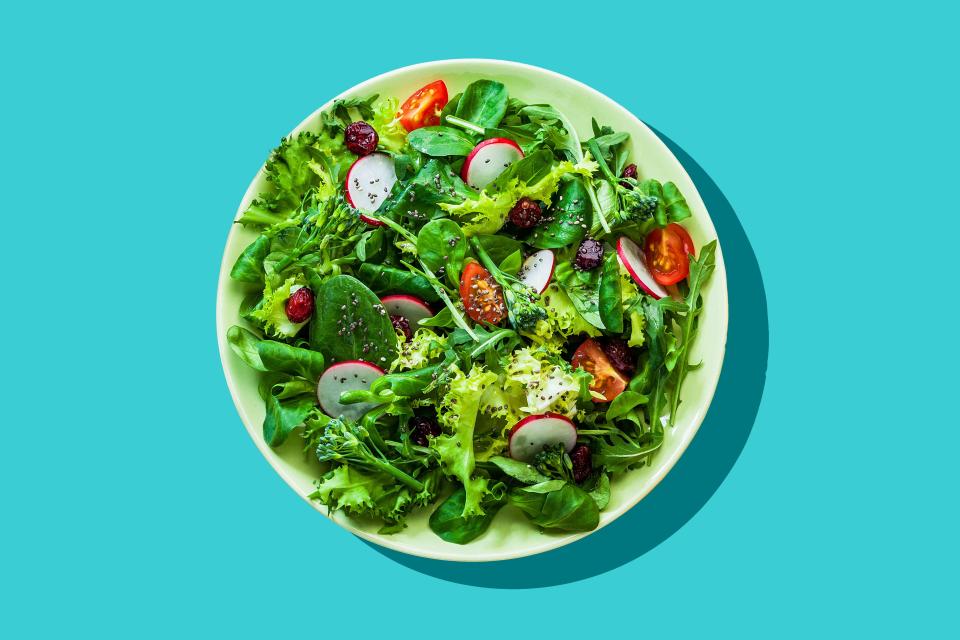
FCA Foto Digital/Getty Images
Did you know that what you eat for lunch can help you control unwanted inflammation in the body? Some inflammation is actually important in certain cases, like when you’re sick or injured. But when that inflammation goes from acute and temporary (beneficial) to chronic and long-term (harmful), your health can suffer. The good news is that certain healthy lifestyle choices, including eating nutritious, anti-inflammatory foods, can help reverse inflammation and keep it at bay. Hence, the health-related perks of packing an anti-inflammatory lunch.
Related: How to Start Eating More Anti-Inflammatory Foods—and Why It's So Important
What Is Inflammation?
Things in life are rarely black or white—there’s often a gray area, and that’s certainly the case when it comes to inflammation. As with high cholesterol or high blood pressure, having inflammation is always viewed as a “bad” thing. And while it can be, some inflammation is helpful and necessary.
“Acute inflammation can be beneficial, as it can be a part of the healing process,” explains Lauren Manaker, RDN, LD, a registered dietitian in Charleston, South Carolina. “Chronic inflammation, on the other hand, is linked to some unsavory health effects.”
Inflammation is your body’s natural response to protect you from harm—inflammation, for instance, is responsible for the symptoms you experience when fending off illness. The inflammatory response helps the body heal itself from cuts, infections, and injuries. But when there isn’t immediate harm, but your body initiates an inflammatory response anyway, you may have a bout of chronic inflammation. This type of inflammation isn’t so good and can even increase the risk of heart disease, type 2 diabetes, and other chronic diseases.
How Diet Affects Inflammation
There are several potential factors that can cause or contribute to inflammation, including infections that turn chronic, physical inactivity, gut health imbalances, unchecked stress, and dietary choices.
Some foods have anti-inflammatory effects, while other foods can trigger or perpetuate inflammation, says Krista Wale, RD, LDN, a Louisiana-based registered dietitian. Pro-inflammatory foods include ultra-processed foods and those high in added sugars, she says. Red meat, white breads and other refined grains, fried foods, baked goods, sugary beverages, high-sodium foods, and trans fats can all cause inflammation, too, according to a 2019 research paper in Nature Medicine on chronic inflammation and its effects on health and lifespan. These foods can activate the body’s inflammatory response, contributing to a cycle of chronic inflammation over time.
Since the food we eat does play a role in inflammation, Manaker recommends taking advantage of that role by actively choosing anti-inflammatory foods where possible. Certain foods can lower levels of inflammation, due to the various nutrients they contain. “The Mediterranean diet is a quintessential example of an anti-inflammatory diet,” she says. “It includes foods like olive oil and other healthy fats, whole grains, produce, fish, herbs, and spices—all of which can help lower inflammation.” These foods are rich in nutrients that have been positively associated with reducing inflammation, such as dietary fiber, antioxidants, and omega-3 fatty acids.
Anti-Inflammatory Lunch Staples
For many people, putting together a balanced midday meal can be the most challenging. If reducing inflammation is your goal, Manaker and Wale suggest building your lunches around the following anti-inflammatory foods:
Healthy fats, such as olive oil, avocado, nuts, and seeds
Fatty fish
Legumes
Herbs and spices
This way of eating encourages you to prioritize whole, plant-based foods and lean sources of protein. It may seem like a lofty goal at first, but eventually you can aim to make fruits and vegetables half of your plate. You should also eat plenty of whole grains, legumes, and healthy fats to get a variety of nutrients. You can also incorporate moderate amounts of animal protein, such as fatty fish, poultry, eggs, and low-fat dairy. These foods provide protein, healthy fats, vitamins, and minerals.
Related: 6 Terrific Sources of Plant Protein for an Added Boost of Fuel
Anti-Inflammatory Lunch Ideas
Cauliflower With Kale, Crispy Chickpeas, and Tahini Dressing
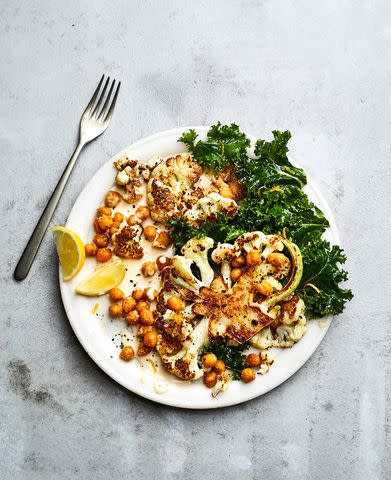
If you’re unsure what filling half of your plate with vegetables could look like, this recipe is a good example. It’s a vegan lunch idea, but you don’t have to be vegan to enjoy it. In fact, recipes like this one, which use legumes as the main protein source, can provide more variety for those who usually get their protein from animal sources. Plus, it gets an antioxidant boost from the kale, Manaker notes.
Avocado Grain Bowl With Beet Ginger Dressing
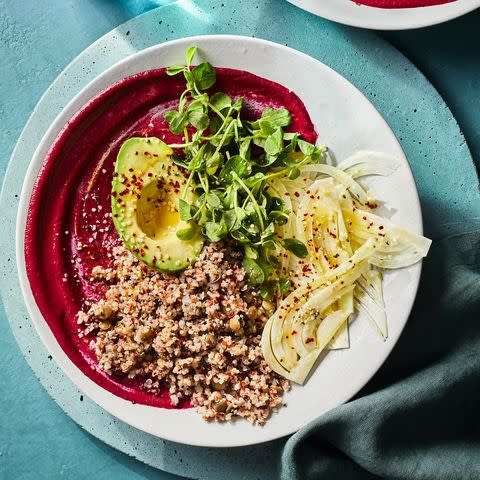
Once you learn how to build a balanced meal, the anti-inflammatory lunch ideas will be endless, Wale says. Her general recommendation is to incorporate veggies for fiber, whole grains, protein, and healthy fats. This grain bowl recipe has it all: lentils for protein, brown rice and quinoa for whole grains (and more protein!), and beets and fennel as veggies. With avocado and probiotic-rich kefir, it’s also got your healthy fats. These are the makings of an anti-inflammatory meal, she says.
Grilled Chicken and Spinach Quesadillas
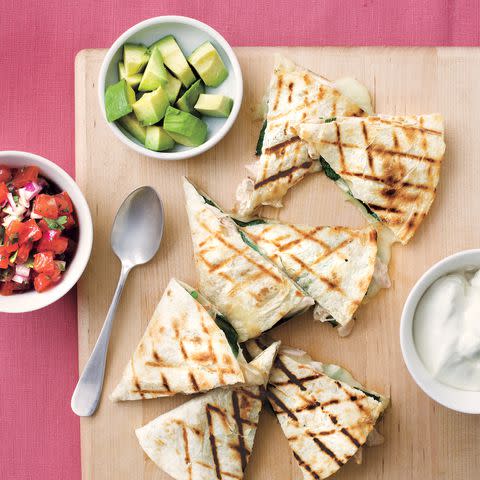
When you need something that comes together quickly, try following a recipe that uses mostly prepared ingredients—convenience foods can be nutritious and anti-inflammatory! Grocery store rotisserie chicken is ready to shred or cube, and use pre-shredded cheese and jarred salsa or pico de gallo. The chicken provides lean protein, Wale says, and this dish also has avocado for healthy fats. For veggies, it’s packed with spinach, which has been shown to possess anti-inflammatory properties.
Roasted Salmon With Beet Salad

When asked for their top anti-inflammatory food recommendations, dietitians almost always name fatty fish—particularly salmon. “Fish like salmon and mackerel are high in omega-3 fatty acids,” Manaker says. Research has found that omega-3 fatty acids help reduce inflammation, which can help decrease activity in autoimmune diseases like rheumatoid arthritis.
This lunch idea involves roasted salmon with a bright side salad. It’s one you can meal prep ahead of time for people who take their lunch to work, and it contains beets, one of Manaker’s top favorites for adding antioxidants to savory meals.
Grilled Chicken and Pepper Salad
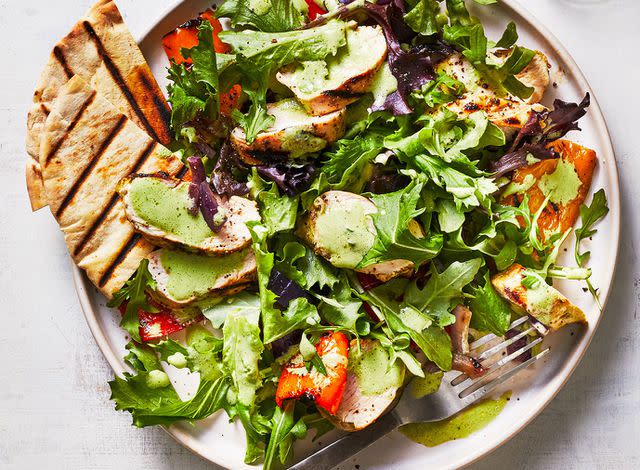
If you love chicken, this popular protein source can absolutely be part of an anti-inflammatory diet, Wale says. You’ll want to stick to the leaner cuts, however, like the boneless, skinless chicken breast used in this salad recipe. It also contains colorful fruits and vegetables like sweet mini peppers, red onions, parsley, and lemon. Adding color to your plate through a variety of vegetables is key to getting more anti-inflammatory antioxidants, Manaker says. It also contains fresh garlic, which gives the whole meal an anti-inflammatory boost, Wale adds.
Spiced Sweet Potato Soup With Pistachio Dukkah
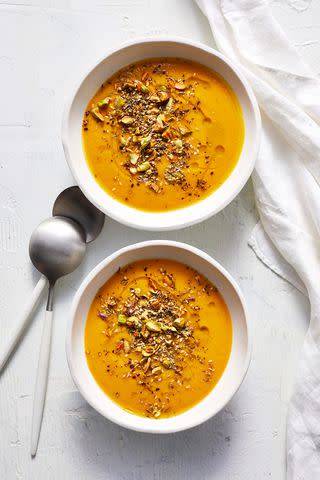
Looking for a lunch idea that’s full of veggies, nuts, seeds, herbs, and spices? This soup recipe contains all these anti-inflammatory powerhouses, but Manaker specifically recommends it as an opportunity to eat more pistachios. “Pistachios are a complete plant-based source of protein and they are well-known for both their anti-inflammatory and antioxidant activities,” she explains, pointing to data published in Nutrients.
While pistachios add a satisfying crunch and dose of anti-inflammatory nutrients to this dish, let’s not forget the star of the show—sweet potato. This root veggie contains antioxidants called carotenoids, which are especially beneficial for eye health, but are also associated with reduced inflammation.
Chickpea Salad Sandwich
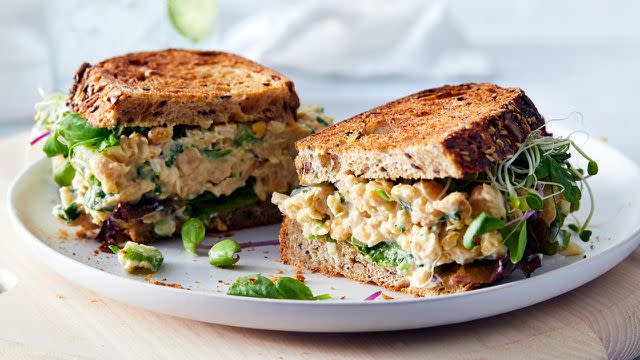
Few foods are as portable as the sandwich, which is why no list of lunch ideas is complete with one. This sandwich is a vegetarian take on the classic chicken or tuna salad sandwich. How does it replace the texture and protein content without poultry or fish? Chickpeas. “Chickpeas are rich in fiber and other nutrients, which support gut health,” explains Samantha Cassetty, MS, RD, a registered dietitian in New York City. And since gut and immune health are linked, supporting a healthy gut through diet can help play a role in regulating inflammation, she adds. It’s also got a handful of antioxidant-rich veggies like celery, parsley, shallots, and lettuce. With whole wheat bread for grains and olive oil-based mayonnaise for fat, it’s a balanced lunch you take on the go.
Related: 5 Gut-Healthy Lunch Ideas to Eat All Week Long
For more Real Simple news, make sure to sign up for our newsletter!
Read the original article on Real Simple.

